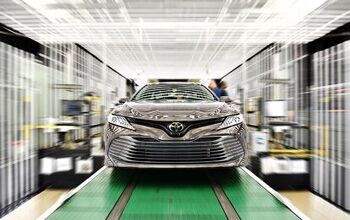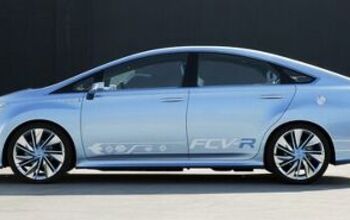Will Toyota Leave Japan?

For a while, TTAC has been tracking a strange story: Instead of exporting cars, Japanese carmakers (or should we call them factorymakers?) increasingly resort to exporting car factories. The higher and higher yen makes exports prohibitively expensive. On the other hand, a higher and higher yen buys more and more production capacity abroad. From Nissan to Mitsubishi, there is a chorus that sings the song that suddenly, people in low wage countries can make high quality cars. Now nobody would assume that Japanese carmakers plan a wholesale desertion of the land of Nippon, right? Wrong.
Today, we find an odd statement in The Nikkei [sub]: Toyota denies that they will leave Japan. At least not now …
According to Japan’s premium business wire, “Toyota Motor Corp is not considering hastily shifting production overseas despite the yen’s strengthening against the dollar, President Akio Toyoda said Monday.” Hmm. Did anyone suspect he would? Apparently, yes.
“We will not readily shift production outside of Japan, except in the most unusual circumstances,” said Akio Toyoda, probably in the direction of the Japanese government.
The most unusual circumstances might already be here. “Theoretically speaking, Toyota cannot afford to compete with its rivals,” Toyoda says.
They can easily compete if they shift production to low cost, soft currency countries, such as Thailand, or straight to the end user markets, such as the USA and Europe. In the latter case, the problem of how the foreign currency looks when converted into Japanese Yen remains. For that problem, there is another solution, which nobody dares to utter: Shift the headquarters abroad. A few years ago, large German companies made noises about moving their HQ into lower tax countries. Opel (make that GM Europe) actually moved to Switzerland. The German government got the message.
The Japanese government (with which the carmakers are a bit at odds) is probably thinking about what to make of Toyoda’s not so subtle hint.
PS: Did I mention that anyone who babbles about a soft Yen should have his head examined? Just in case I didn’t, I mention it again. Long term hospitalization is advised.

Bertel Schmitt comes back to journalism after taking a 35 year break in advertising and marketing. He ran and owned advertising agencies in Duesseldorf, Germany, and New York City. Volkswagen A.G. was Bertel's most important corporate account. Schmitt's advertising and marketing career touched many corners of the industry with a special focus on automotive products and services. Since 2004, he lives in Japan and China with his wife <a href="http://www.tomokoandbertel.com"> Tomoko </a>. Bertel Schmitt is a founding board member of the <a href="http://www.offshoresuperseries.com"> Offshore Super Series </a>, an American offshore powerboat racing organization. He is co-owner of the racing team Typhoon.
More by Bertel Schmitt
Latest Car Reviews
Read moreLatest Product Reviews
Read moreRecent Comments
- Ltcmgm78 Just what we need to do: add more EVs that require a charging station! We own a Volt. We charge at home. We bought the Volt off-lease. We're retired and can do all our daily errands without burning any gasoline. For us this works, but we no longer have a work commute.
- Michael S6 Given the choice between the Hornet R/T and the Alfa, I'd pick an Uber.
- Michael S6 Nissan seems to be doing well at the low end of the market with their small cars and cuv. Competitiveness evaporates as you move up to larger size cars and suvs.
- Cprescott As long as they infest their products with CVT's, there is no reason to buy their products. Nissan's execution of CVT's is lackluster on a good day - not dependable and bad in experience of use. The brand has become like Mitsubishi - will sell to anyone with a pulse to get financed.
- Lorenzo I'd like to believe, I want to believe, having had good FoMoCo vehicles - my aunt's old 1956 Fairlane, 1963 Falcon, 1968 Montego - but if Jim Farley is saying it, I can't believe it. It's been said that he goes with whatever the last person he talked to suggested. That's not the kind of guy you want running a $180 billion dollar company.


































Comments
Join the conversation
Japan is ahead of the curve compared to it's Asian neighbors in preparing for the economic shifts in play. The rest of Asia is locked into the same old thinking of a continuing strong Dollar + a strong Euro while having their own currency weak for their export market. Over the next few years they will either have stronger currencies in Asia or we will have a currency/trade war. China is at center stage. Japan understands that trying to predict currency valuations and react is an act in futility. The time needed to make shifts take too long. In theory currency valuations should correct trade imbalances over time. So as these happen it can also quickly go the other way. So the Japanese thinking may be why not just establish operations in each key market as a "point of manufactiuring". Then change the percentage of production from either Japan or the alternative "point of manufacturing" depending on the currency valuations & commodities at the time. Now they have a 1-2 month reaction time instead of 1-2 years.
I'm more concerned about the fate of the smaller Japanese automakers. Toyota will be fine. Yes, they will move more production to other countries, but their heart is Japanese.